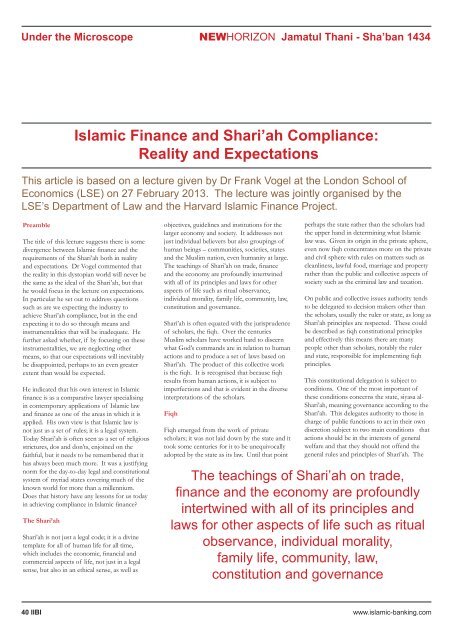NEWHORIZON
NEWHORIZON - Institute of Islamic Banking and Insurance
NEWHORIZON - Institute of Islamic Banking and Insurance
- No tags were found...
Create successful ePaper yourself
Turn your PDF publications into a flip-book with our unique Google optimized e-Paper software.
Under the Microscope<br />
<strong>NEWHORIZON</strong> Jamatul Thani - Sha’ban 1434<br />
Islamic Finance and Shari’ah Compliance:<br />
Reality and Expectations<br />
This article is based on a lecture given by Dr Frank Vogel at the London School of<br />
Economics (LSE) on 27 February 2013. The lecture was jointly organised by the<br />
LSE’s Department of Law and the Harvard Islamic Finance Project.<br />
Preamble<br />
The title of this lecture suggests there is some<br />
divergence between Islamic finance and the<br />
requirements of the Shari’ah both in reality<br />
and expectations. Dr Vogel commented that<br />
the reality in this dystopian world will never be<br />
the same as the ideal of the Shari’ah, but that<br />
he would focus in the lecture on expectations.<br />
In particular he set out to address questions<br />
such as are we expecting the industry to<br />
achieve Shari’ah compliance, but in the end<br />
expecting it to do so through means and<br />
instrumentalities that will be inadequate. He<br />
further asked whether, if by focusing on these<br />
instrumentalities, we are neglecting other<br />
means, so that our expectations will inevitably<br />
be disappointed, perhaps to an even greater<br />
extent than would be expected.<br />
He indicated that his own interest in Islamic<br />
finance is as a comparative lawyer specialising<br />
in contemporary applications of Islamic law<br />
and finance as one of the areas in which it is<br />
applied. His own view is that Islamic law is<br />
not just as a set of rules; it is a legal system.<br />
Today Shari’ah is often seen as a set of religious<br />
strictures, dos and don’ts, enjoined on the<br />
faithful, but it needs to be remembered that it<br />
has always been much more. It was a justifying<br />
norm for the day-to-day legal and constitutional<br />
system of myriad states covering much of the<br />
known world for more than a millennium.<br />
Does that history have any lessons for us today<br />
in achieving compliance in Islamic finance?<br />
The Shari’ah<br />
Shari’ah is not just a legal code; it is a divine<br />
template for all of human life for all time,<br />
which includes the economic, financial and<br />
commercial aspects of life, not just in a legal<br />
sense, but also in an ethical sense, as well as<br />
objectives, guidelines and institutions for the<br />
larger economy and society. It addresses not<br />
just individual believers but also groupings of<br />
human beings – communities, societies, states<br />
and the Muslim nation, even humanity at large.<br />
The teachings of Shari’ah on trade, finance<br />
and the economy are profoundly intertwined<br />
with all of its principles and laws for other<br />
aspects of life such as ritual observance,<br />
individual morality, family life, community, law,<br />
constitution and governance.<br />
Shari’ah is often equated with the jurisprudence<br />
of scholars, the fiqh. Over the centuries<br />
Muslim scholars have worked hard to discern<br />
what God’s commands are in relation to human<br />
actions and to produce a set of laws based on<br />
Shari’ah. The product of this collective work<br />
is the fiqh. It is recognised that because fiqh<br />
results from human actions, it is subject to<br />
imperfections and that is evident in the diverse<br />
interpretations of the scholars.<br />
Fiqh<br />
Fiqh emerged from the work of private<br />
scholars; it was not laid down by the state and it<br />
took some centuries for it to be unequivocally<br />
adopted by the state as its law. Until that point<br />
perhaps the state rather than the scholars had<br />
the upper hand in determining what Islamic<br />
law was. Given its origin in the private sphere,<br />
even now fiqh concentrates more on the private<br />
and civil sphere with rules on matters such as<br />
cleanliness, lawful food, marriage and property<br />
rather than the public and collective aspects of<br />
society such as the criminal law and taxation.<br />
On public and collective issues authority tends<br />
to be delegated to decision makers other than<br />
the scholars, usually the ruler or state, as long as<br />
Shari’ah principles are respected. These could<br />
be described as fiqh constitutional principles<br />
and effectively this means there are many<br />
people other than scholars, notably the ruler<br />
and state, responsible for implementing fiqh<br />
principles.<br />
This constitutional delegation is subject to<br />
conditions. One of the most important of<br />
these conditions concerns the state, siyasa al-<br />
Shari’ah, meaning governance according to the<br />
Shari’ah. This delegates authority to those in<br />
charge of public functions to act in their own<br />
discretion subject to two main conditions that<br />
actions should be in the interests of general<br />
welfare and that they should not offend the<br />
general rules and principles of Shari’ah. The<br />
The teachings of Shari’ah on trade,<br />
finance and the economy are profoundly<br />
intertwined with all of its principles and<br />
laws for other aspects of life such as ritual<br />
observance, individual morality,<br />
family life, community, law,<br />
constitution and governance<br />
40 IIBI<br />
www.islamic-banking.com
















